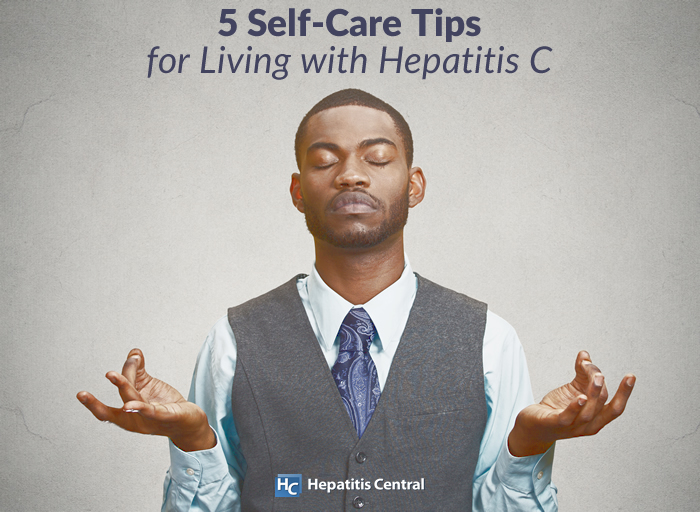5 Self-Care Tips for Living with Hepatitis C


If you are diagnosed with hepatitis C, medications are generally prescribed. But there are also a few things you can do in the form of self-care that may be beneficial to your health, both mentally and physically.
With that in mind, here are five self-care tips that are helpful for people with the hepatitis C virus (HCV).
1. Take Time to De-Stress
Stress can take a toll on anyone, regardless of the status of their health. But if you have the hep C virus, enduring a lot of stress in your everyday life has another negative consequence in that it can potentially increase your risk of depression. (1)
Make it a priority to regularly lower your stress levels, which helps to reduce their impact on your mental health.
- For instance, you can do something just for yourself every day, no matter how small that something is.
- If you’re feeling down, touch base with a friend or family member who always makes you feel better.
It can also be helpful to work on improving your coping skills so the stressors in your life don’t have such an impact.
2. Schedule Regular Social Outings
It can be common for people with hepatitis to feel socially isolated. With this social isolation often comes depression, anxiety, and stress. (2) To help combat this, schedule things on your calendar that will help you spend more time with other people.

- Putting this self-care tip into practice could be as simple as meeting a friend after work one night for coffee to catch up and have a few laughs.
- You can also look for local events that you might want to attend, such as a music concert or buying tickets to see your favorite sports team.
- If you enjoy playing sports yourself, you may want to consider joining a league. This can help keep you physically active while also meeting your social needs.
3. Get Physically Active (Even If it’s Not Exercise)
Speaking of physical activity, research has found that engaging in some type of exercise or other forms of physical activity regularly can improve your health-related quality of life if you have hepatitis C—regardless of the parameters of the disease. (3)
So, if you’re not fond of exercise, just look for some other form of activity that you do enjoy that will also get you moving.

- One option is to do yard work or tend to your garden.
- You can also take your dog for a walk or play with your kids or grandkids outside.
- Other non-exercise ways to boost your physical activity include parking further away from the door when going to the store, taking the stairs instead of the elevator or escalator, and pacing while on the phone versus standing still. All of these will get you moving more throughout the day.
4. Adhere to Your Treatment Regimen
Hepatitis C infection is often treated with antiviral medications. These medications may be prescribed for up to 24 weeks, depending on your situation and the level of damage to your liver. Although it may be tempting to not complete your entire HCV therapy, especially if you start to feel better, doing so can keep you from being successfully treated.
In a study involving 206 people with chronic hepatitis C who also took direct-acting antivirals, achieving a sustained virological response had several positive effects.
These include:
- reduced mobility issues
- lower pain and discomfort levels
- and improvements in anxiety and depression. (4)
In short, completing your treatment enables you to enjoy effects such as these.
5. Seek Treatment for an Alcohol Use Disorder
Alcohol is hard on the liver. That’s why it’s advised to avoid this type of beverage when you have hepatitis C. The trouble with this advice is that alcohol use disorder and HCV-related liver disease often go hand in hand. However, drinking alcohol while being treated for HCV can reduce the treatment’s benefits. (5)
Seeking treatment can help when you’ve been diagnosed with hep C and are struggling to quit drinking. You can call the Substance Abuse and Mental Health Services Administration (SAMHSA) any time of the day or night via their free national helpline at 1-800-662-HELP (4357). They can provide information and connect you with local resources available in your area.
Self-care practices such as these can be helpful when you have hepatitis C. Many have the ability to not just make you feel better, but also to improve your quality of life.
(1) Yeoh, S., Holmes, A., Saling, M., Everall, I., Nicoll, A. (2018). Depression, Fatigue and Neurocognitive Deficits in Chronic Hepatitis C. Hepatology International. doi:10.1007/s12072-018-9879-5
(2) Sarbarzeh, P., Karimi, S., Jalilian, M., Mosafer, H. (2020). Depression, Anxiety, Stress and Social Isolation in Hepatitis Patients. SciMedicine Journal. doi:10.28991/SciMedJ-2020-0204-5
(3) Hallsworth, K., Gosrani, S., Hogg, S., et al. (2020). Association of Exercise Participation Levels with Cardiometabolic Health and Quality of Life in Individuals with Hepatitis C. BMJ Open Gastroenterology. doi:10.1136/bmjgast-2020-000591
(4) Juanbeltz, R., Martinez-Baz, I., San Miguel, R., Goñi-Esarte, S., Cabasés, J., Castilla, J. (2018, October 9). Impact of Successful Treatment with Direct-Acting Antiviral Agents on Health-Related Quality of Life in Chronic Hepatitis C Patients. PLoS One. doi:10.1371/journal.pone.0205277
(5) Alavi, M., Janjua, N., Chong, M., et al. (2018, March). The Contribution of Alcohol Use Disorder to Decompensated Cirrhosis Among People with Hepatitis C: An International Study. Journal of Hepatology. doi:10.1016/j.jhep.2017.10.019







